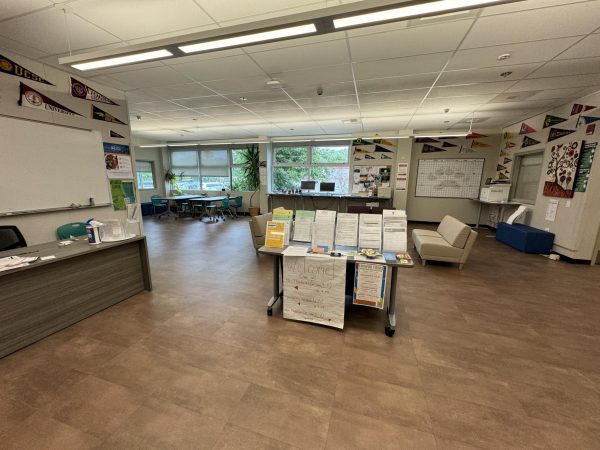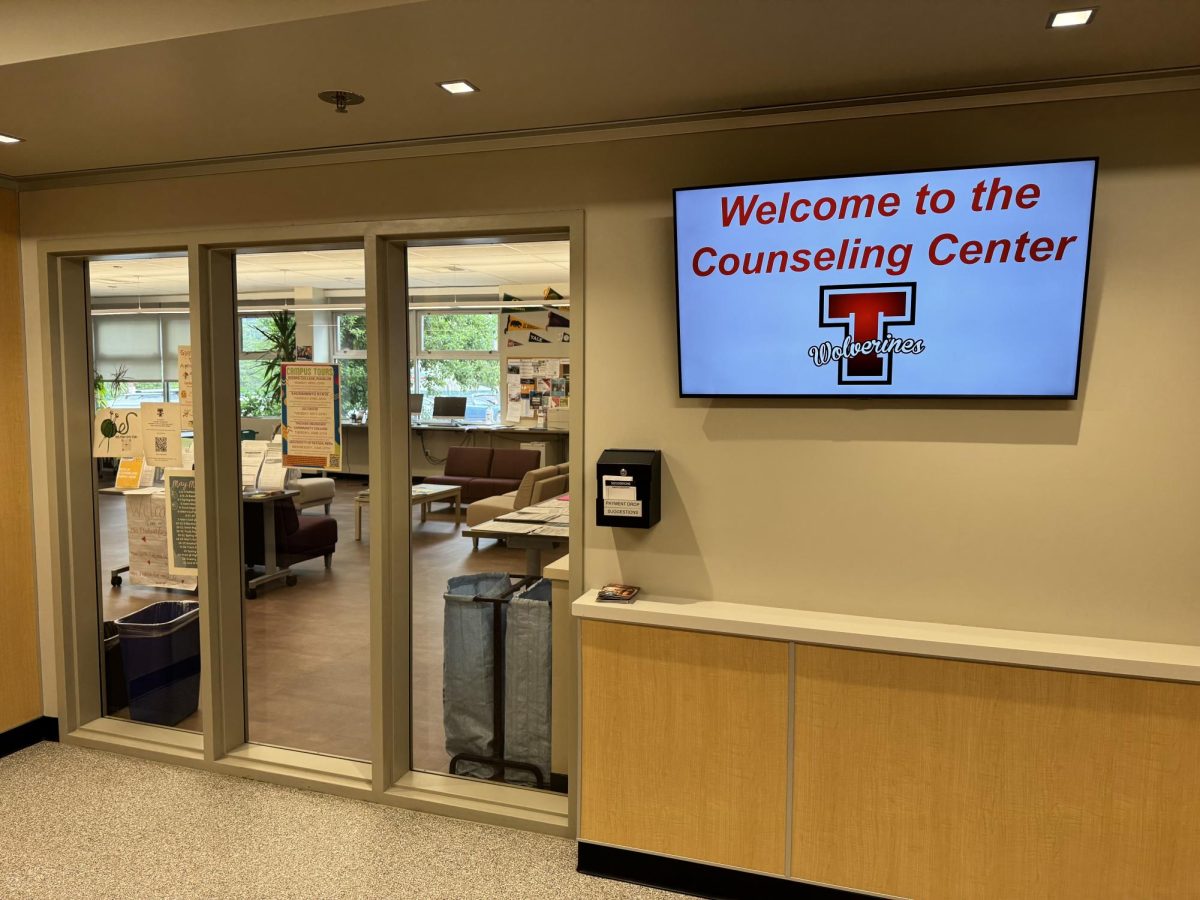When a student walks into the counseling center in September asking to change into another class because they think that their teacher “does not fit their learning style,” the problem illustrated in this exchange is much deeper than just learning styles.
It all starts with the Master Schedule, the matrix that dictates which teachers teach which classes and when those classes are offered. Building the Master Schedule is an incredibly complex problem influenced by multiple factors, from student course requests to teacher availability and credentials.
“The issue of changing classes has a significant ripple effect.” According to THS Counselor Kelly Eberhardt, a new system is being developed for next year to prioritize needs. Eberhardt says direct teacher requests will only be accepted in credit recovery situations.
Kelly Eberhart, one of the counselors at THS, comments on how the master schedule operates. The master schedule is the schedule of all the classes for the whole school. Eberhart says, “The issue of changing classes has a significant ripple effect.” Eberhart continues by saying that this year, the counseling department will first use a Google form to submit requests for class changes based on need. Direct teacher requests will not be accepted unless students have already taken a course with that teacher and possibly failed.
Eberhart said, “We feel the pressure because we want to make families and students happy, and we want students to be most successful.” To make the system more equitable, the department has moved away from granting most individual requests, a practice counselors refer to as “concierge counseling.” She says it is a “process so all students have an equal opportunity to get courses that they need or want.” However, the necessary system is to find a way that makes sense for all parties involved.
In addition to hand-picking instructors based on rumor, the issue of off periods and TAs is immense; Eberhart says, “Ever since COVID, I think students have been looking for some kind of flexibility in their learning environment, and we have adapted to that at Truckee High School.” There are many reasons why students choose to have off-campus periods. For example, I could take courses at Sierra College or work after-school jobs. She notes that these off-campus periods are for upperclassmen, but this contradicts how the course system is operating now. “Moving into next year, the policy will be a little tighter, and students will need to have three graded classes all year long if they are a Truckee high athlete per the NIAA,” Eberhart said.
Ultimately, the goal is to retain some student choice while tightening up what has become a free-for-all. “We appreciate the students’ engagement with the course requests process. We take those seriously into account,” Eberhardt said. The mass requests to switch classes often stem from a perception that one class could be easier than another.

The counseling department has many moving parts and details that need to be taken into account. Teachers and academic departments are also finding ways to meet students’ needs and uphold regulations.
English Department Head Alex Close says, “Teachers have some freedom in approaching the standards, and California state standards dictate all of our classes. So, we all have to address those standards and hit them. But there’s no requirement on how to go about that.” This can result in wide variation between like-courses. Many students experience these discrepancies at THS. Close says that despite this freedom, there should be some level of alignment.
“All classes should have a consistent level of rigor to them,” Close said.
“According to Close, it is up to the school to maintain this level. “With any school anywhere, there’s always a perception that a certain teacher might be easier than another teacher. And it’s the school’s responsibility not to let kids choose their classes based on that,” Close said. He said that this is something that the school is currently working to alter.
According to Close, the issue goes deeper into school culture.
“High school kids are trying to get through this system, and they don’t see a value in the learning; they just see a value in the grades and the diploma. I think it’s up to the school to set and enforce those boundaries,” Close said. He continued that students are brilliant in asking to switch classes, but the issue depends on teachers not having too much course variability.
Because students face immense pressure, they impose significant pressures on teachers and counselors to help ease that burden.
“If a student can get through school easily, then that’s probably what they will try to do,” Close said. Because students often view school as something more like a hurdle or a stepping stone to rush past, it’s up to the school to institutionalize its value.
“Between teachers and administration, we’re trying to keep kids in school more. We have a lot of kids on off periods, and our block schedule allows students to not be in class and still graduate on time.” Close said that this is the central issue currently being addressed.
Truckee High School Principal John Neuberger is central to this movement. Neuberger is working to implement many changes in the coming years to improve course discrepancies and inequities. Neuberger also acknowledges that it all starts with the Master Schedule.
“I’m trying to ensure that we’re utilizing the master schedule to support students in the best way possible,” Neuberger said.
He says, “The goal is that we have a master schedule that is student-centered and gets kids to want to come to class.” TAs are also part of the large group of students with off-campus periods. Neuberger said, “It’s not just office TAs, but for teachers, which happened because of COVID. Everybody was off the normal trajectory of what students would normally be on.”
Neuberger continues by mentioning that many students are taking college courses for academic enrichment. This makes planning for the master schedule extremely difficult. He says that this impacts the ability to make students take a class at THS and also to keep track of what courses are needed for the master schedule.
The master schedule is not just about the number of classes; it also impacts the number of teachers, when they get prep periods, how many courses need to be offered, and so many other small details that students do not think about beyond what the easiest course is.
Neuberger said, “We know kids will do that cheap teacher shopping. When at all possible, we try not to do that.” He alludes to students looking for a more accessible teacher and course than another section of the same course. Sierra College is another very complex aspect of course issues. Many students believe that they need an off period to take Sierra College courses. Neuberger says, “If we’re being honest, they’re not doing that extra college course during that time. What we want to do for students is set them up to get ready for that next step.” He continues, “There’s going to be an increased push to support more students on campus and take a high-quality education. We have a great school. We have excellent teachers; we have classes that kids want to take for the most part. And yeah, we’re working on getting even more of those electives kids want to take.”
Additionally, the administrators are working to add more exciting electives for students to take. Another layer is the massive number of athletes in the school. The off periods are effective for student-athletes attending games and competitions. To play a sport for Truckee High, currently, students need two academic classes on campus and one off campus. Neuberger says, “It’s hard for us to manage those students taking those classes off campus.” It’s hard because the NIAA mandates a certain GPA to compete in the league, and Truckee High does not know if you pass the class you are talking about outside of school while playing a sport. He said moving forward, Truckee High will require three academic courses on campus, which is a change from what it is currently.
Starting next year, students may have a slightly different experience. Ultimately, Nueberger’s goal is to focus on equity and help students find meaningful and fair classes.
“I want to get more kids on campus,” Neuberger said.

